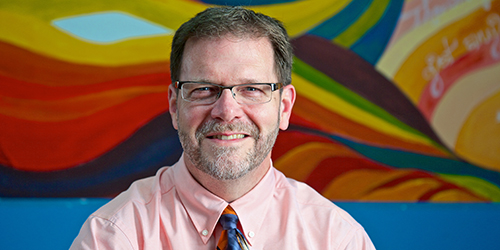Jerry Peterson

Ruth Ellis Center Executive Director Jerry Peterson. BTL File Photo.
A silent crisis is growing among us. During a period of unprecedented advances in rights and acceptance for some LGBTQ folks across the United States, the silent crisis present in the lives of far too many LGBTQ youth in Detroit has deepened — especially for LGBTQ youth of color experiencing homelessness. Since the mid-'90s, the LGBTQ movement has focused heavily on civil rights and legal protections which have largely benefitted white people with resources while ignoring the imperative to fight for social services and resources for disenfranchised members of our own community. The class and privilege divide between the haves and the have-nots is wider than ever and alarmingly present in the LGBTQ community.
The advances won with enormous coordinated effort and financial resources from the LGBTQ movement in the last year are of little benefit to most of the young people we serve at the Ruth Ellis Center. In fact, these advances intensify the silent crisis for some LGBTQ youth in Detroit. I witness the harmful effects of the angry backlash of rejection from conservatives and people who don't understand LGBTQ identities, adding more stress and increasing risk for LGBTQ young people who continue to be demonized because of who they are. The increased visibility and focus on LGBTQ rights motivates some people to become more accepting while others become even more entrenched in rejection and oppression, leading to physical and emotional violence and unsafe conditions for LGBTQ youth. Those who are homeless are especially impacted, as are those in foster care and the juvenile justice system — far more often than most people imagine.
The dedicated staff at the Ruth Ellis Center works tirelessly to address the traumatic impact family rejection, unemployment, homelessness, couch-surfing, racial profiling, systematic oppression, discrimination and sexual exploitation have on LGBTQ young people who have precious few supports or protections. These young people deserve our advocacy and support — not to be demonized and blamed for their circumstances or, more fundamentally, for who they are. The question we must ask regarding homeless LGBTQ youth in Detroit is not, "Why do they make bad choices?" or, "How can their families reject them?" but rather, "What can we do about the social conditions of prejudice, fear and discrimination that limit their choices and prevent deserving young people from experiencing advances similar to the rest of the LGBTQ movement?"
The first questions blame those who are powerless to fix the root causes of the crisis and exonerate the perpetrators of oppression. The second moves us toward accepting responsibility for doing what we can to change the status quo. We must look beyond our own comfort zones and come together as caring adults, local activists, funders and service providers working collaboratively with LGBTQ youth to expand their options for social support and access to resources. Responses to these invisible challenges for LGBTQ youth have tended to be dictated by conventional, mainstream ideas about home, stability and relationships. We have to come together to reimagine what home, family and community can be.
The Ruth Ellis Center was formed in 1999 to help LGBTQ homeless youth specifically, creating a full-service drop-in-center, mental health services and Ruth's House, a state-licensed foster care residential program for up to nine LGBTQ youth at a time. As important and life-giving as these services have been, we have to press on to address the deeper needs for support and stability to succeed in life. That's why we are expanding our services this year to open the Ruth Ellis Health & Wellness Center, which will provide mental health, substance use disorder and primary health care to LGBTQ young people who don't have access to care anywhere else. Watch for the public launch of the capital campaign soon.
Another approach to LGBTQ youth homelessness launched in 2015 focuses on prevention, stressing the importance of working with individual families to keep young people from becoming homeless in the first place. But the Ruth Ellis Center cannot fix these problems alone. To solve this crisis, average citizens must find their voice to break the silence! Talk about these issues with your friends, educate yourself, become an agent of change within your own circles. Befriend families that are fearful of accepting their LGBTQ children and show compassion and empathy for their fear; stop demonizing, blaming and labeling them. Is that really the way to produce positive change in people?
This silent crisis has not developed in a vacuum; rather it reflects broader instabilities and failures in families and institutions across our community. Nonprofit services are vital, but the community must come together to address the complex root causes of homelessness and other barriers to success among LGBTQ youth. Step out of your comfort zone and become part of the solution.










